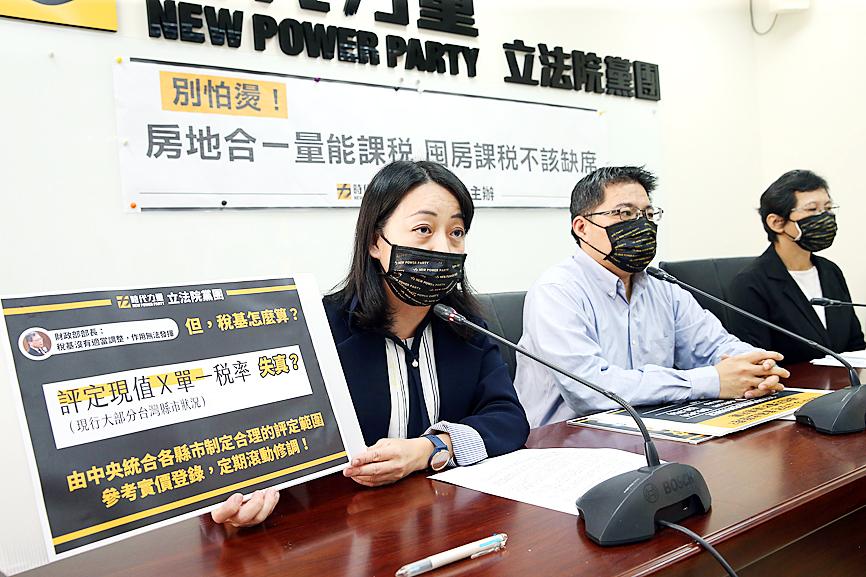The New Power Party (NPP) yesterday urged the Executive Yuan to implement an integrated housing and land taxation system, as well as a vacant home tax to increase the nation’s housing supply.
An amendment to the Income Tax Act (所得稅法), which was approved by the Cabinet on Thursday last week, redefines “short-term property ownership” by extending the duration from the previous limit to five years from two years.
Under the new tax system, private individuals and institutions would pay a 45 percent tax on the profit they gain from selling homes or properties within two years of purchase, while those who sell within two to five years of purchase would pay a 35 percent tax.

Photo: CNA
NPP Chairwoman Chen Jiau-hua (陳椒華) said that while the party recognizes the government’s efforts in tackling an urgent and thorny issue, simply redefining short-term property ownership would not stop those with “deep pockets” from hoarding houses.
The government should define a tax bracket for gains from housing sales, Chen said, adding that people earning high profits from housing transactions should pay higher taxes.
If homeowners are willing to decrease selling prices, they would pay less property transaction tax, she said.
“This would not only guarantee a reasonable return on investment for homeowners, but it would also effectively curb the excessive rise in housing prices,” Chen said.
The deductible in transactions involving owner-occupied homes in the integrated housing and land taxation system was stipulated based on the housing market in 2015, Chen said, adding that the Ministry of Finance should survey the current housing market and readjust the deductible.
NPP caucus director Claire Wang (王婉諭) said the government should change the tax base and implement a tax bracket in the new tax system, otherwise real housing justice would never be achieved.
The Ministry of Finance should consult local government officials and review the actual housing prices registered by homeowners before readjusting the tax base, Wang said, adding that this would ensure reasonable housing prices in every locality.
The NPP also proposed a tax bracket that would protect homeowners and lower the percentage of people owning multiple homes, Wang said, adding that more vacant homes would in turn be released to the housing market.
The Cabinet delayed levying a vacant home tax on grounds that 780,000 tenants at rental units would be asked to pay the tax instead, Chiu said.
However, the party’s research showed that the Cabinet was citing the number of homeowners owning more than four properties, he said.
“The Cabinet was presuming that these homeowners have rented out each and every house they own to others, which is illogical,” Chiu said.
It has been proven that levying a vacant home tax would cause homeowners to release additional houses they own to the market, which would help stabilize the housing market and inhibit the rise of home prices and rents, he said.
Some people have attributed a hike in home rents in South Korea to a vacant home tax there, which was implemented in 2017, but data show that the annual rent increase in South Korea has since been much lower than that in Taiwan, Chiu said.
The Cabinet should not be frightened by the situation in South Korea and use it as an excuse not to charge vacant home tax, he said.

An essay competition jointly organized by a local writing society and a publisher affiliated with the Chinese Communist Party (CCP) might have contravened the Act Governing Relations Between the People of the Taiwan Area and the Mainland Area (臺灣地區與大陸地區人民關係條例), the Mainland Affairs Council (MAC) said on Thursday. “In this case, the partner organization is clearly an agency under the CCP’s Fujian Provincial Committee,” MAC Deputy Minister and spokesperson Liang Wen-chieh (梁文傑) said at a news briefing in Taipei. “It also involves bringing Taiwanese students to China with all-expenses-paid arrangements to attend award ceremonies and camps,” Liang said. Those two “characteristics” are typically sufficient

A magnitude 5.9 earthquake that struck about 33km off the coast of Hualien City was the "main shock" in a series of quakes in the area, with aftershocks expected over the next three days, the Central Weather Administration (CWA) said yesterday. Prior to the magnitude 5.9 quake shaking most of Taiwan at 6:53pm yesterday, six other earthquakes stronger than a magnitude of 4, starting with a magnitude 5.5 quake at 6:09pm, occurred in the area. CWA Seismological Center Director Wu Chien-fu (吳健富) confirmed that the quakes were all part of the same series and that the magnitude 5.5 temblor was

The brilliant blue waters, thick foliage and bucolic atmosphere on this seemingly idyllic archipelago deep in the Pacific Ocean belie the key role it now plays in a titanic geopolitical struggle. Palau is again on the front line as China, and the US and its allies prepare their forces in an intensifying contest for control over the Asia-Pacific region. The democratic nation of just 17,000 people hosts US-controlled airstrips and soon-to-be-completed radar installations that the US military describes as “critical” to monitoring vast swathes of water and airspace. It is also a key piece of the second island chain, a string of

The Central Weather Administration has issued a heat alert for southeastern Taiwan, warning of temperatures as high as 36°C today, while alerting some coastal areas of strong winds later in the day. Kaohsiung’s Neimen District (內門) and Pingtung County’s Neipu Township (內埔) are under an orange heat alert, which warns of temperatures as high as 36°C for three consecutive days, the CWA said, citing southwest winds. The heat would also extend to Tainan’s Nansi (楠西) and Yujing (玉井) districts, as well as Pingtung’s Gaoshu (高樹), Yanpu (鹽埔) and Majia (瑪家) townships, it said, forecasting highs of up to 36°C in those areas